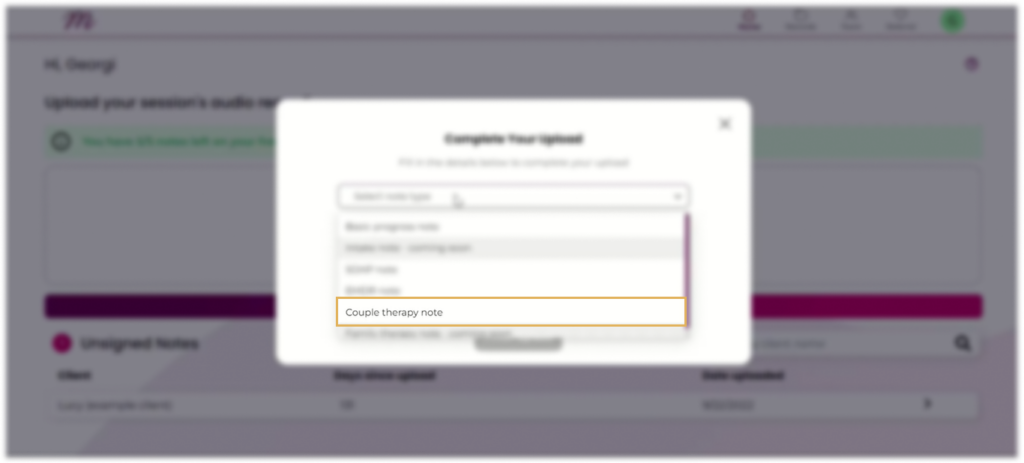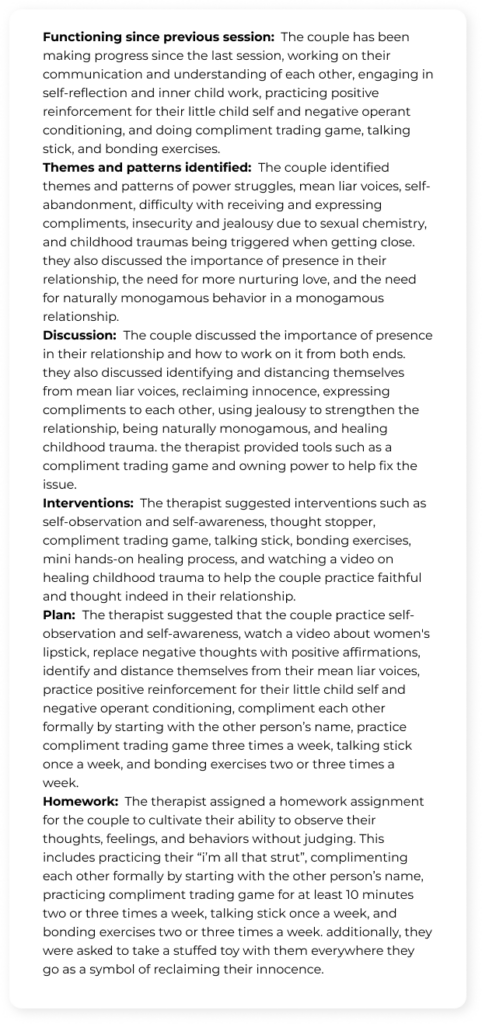Setting the Stage: What Is Couples Therapy?
Think about your relationship with your partner. Is there a lack of intimacy? Do you find yourself struggling with everyday communication? Are there escalating conversations in which one or both of you become emotionally distressed? Have you noticed a lack of sexual connection? Well, if you said yes to any of the above, couples therapy might be your secret PANACEA! “Tell me more,” you are pondering.
Couples therapy is a type of therapy that focuses on helping couples improve their relationships and marriage. It is often used to resolve conflicts, improve communication, and address issues regarding intimacy and sexual satisfaction. Couples therapy can be beneficial for couples of all ages, backgrounds, and orientations. The goal of couples’ psychotherapy is to help couples identify and work through issues related to several aspects of their relationship: roles in the relationship, beliefs and values, finances, sex and intimacy, health issues, external stressors, etc.
Whatever the reason that brought you to therapy, you will always find your therapist taking accurate and detailed therapy notes throughout each and every session. These notes are essential for tracking therapeutic progress over time and grasping better insights into the couple’s issues.
In this article, we will look at what couples counseling notes are, how important it is to take accurate notes during couple psychotherapy sessions, and some tips for taking effective notes.

New! Transfer your notes to EHR with a single click. No more copy-pasting.
What are Couple Therapy Notes?
Couple therapy notes are written records of the sessions of a couple receiving therapy. These notes are used by the psychotherapist to document the progress of therapy, track goals, and treatment plans, and provide a record of the topics discussed and any interventions made. They can include information about the couple’s history, their presenting concerns, the therapeutic relationship, and the therapists’ observations and insights.
The Importance of Couples Therapy Notes
Regardless of the reason couples choose to go to therapy, your first job as a therapist is to acknowledge the huge step each partner has taken by agreeing they want to work on their issues together. This should lead you to set achievable goals for their sessions in honor of the hopes and expectations they have. And one of the most important tips you do not want to miss is: Sit, Listen, and Take notes.
Taking notes throughout your couple’s psychotherapy sessions is important for several reasons. First, such notes provide an accurate record of the couple’s progress over time. By having a record of what was discussed during each session, the therapist can track the couple’s progress and tailor future sessions accordingly. Notes also provide insight into the couple’s relationship dynamics, helping the therapist better understand how the couple interacts with one another.
Additionally, notes can provide valuable information if the couple ever needs to refer back to a past session or revisit a particular issue. Finally, couples’ therapy notes can be used as evidence in court, should the need arise.
Tips for Taking Effective Notes During Couples Therapy
Taking effective notes during couple counseling sessions is an important part of providing effective treatment to couples. Here are some helpful tips you can use for taking accurate, effective, and detailed notes during couples’ therapy:
Listen actively:
Active listening is key when it comes to taking effective notes during a couple counseling sessions. This means paying close attention to what the couple is saying and asking to further understand their concerns or issues. Active listening also ensures, as a therapist, that you capture all important details in your notes.
Focus on the facts:
It is important to focus on the facts when taking notes during a couple’s psychology sessions. Avoid using terms like “good,” “bad,” or any expression that implies judgments or absolutes. This means avoiding making assumptions or judgments about what the couple is saying or how they are feeling. Instead, focus on documenting key facts, such as what was discussed and any agreements that were reached between the couple.
Write shorthand:
Using shorthand allows accurate notes to be taken effortlessly over long intervals, thereby making the note-taking process easier and more efficient. Common abbreviations such as “C” for “couple” or “P” for “problem” can help streamline the note-taking process while improving accuracy.
Note details:
In addition to key facts and agreements, it is equally important to take note of any emotions that were expressed by either partner, as well as any behaviors that were exhibited during the session. This helps provide a fuller picture of what was discussed while providing valuable insights into how the couple interacts with one another.
Review your notes:
Finally, it is important to review your notes after each session to ensure accuracy and completeness. This helps ensure that all key points were captured and that no important information was overlooked or omitted from the notes.
Common Sections in Couples Therapy Notes
Functioning Since Previous Session:
This section describes the couple’s functioning since the last session. It notes changes in the couple’s relationship and identifies any problems that have arisen since the last session. It also includes progress made toward goals discussed in previous sessions.
Themes and Patterns Identified:
This section describes any patterns or themes that have been identified during the session. This includes identifying any issues that are contributing to the couple’s difficulties, as well as any underlying dynamics between the couple.
Discussion:
This section outlines the topics discussed during the session. It should include both what was discussed and how it was discussed, with notes about the couple’s communication style and dynamics.
Plan:
This section outlines plans for follow-up and further action to be taken in future sessions. The plan may include further exploration of topics discussed in the present session or suggested activities for the couple to work on together.
Homework:
This section outlines any tasks or assignments attributed to the couple to complete before their next session. These tasks may include activities related to communication or problem-solving, reading material, journaling, or anything else suggested by the therapist with the aim to equip the partners with tools to help them deal with issues as they crop up.
Conclusion: A Word from Mentalyc
Whenever a couple is going through rough patches, it is your responsibility as a therapist to help revive respect, affection, and intimacy between the partners, ensuring they live happily ever after. Taking accurate and detailed notes during couples’ psychotherapy sessions is essential for ensuring such results for couples. Not only do these notes provide an accurate record of progress over time, but they also provide valuable insight into how the couple interacts with one another and can be used as evidence in court, should the need arise.
By following Mentalyc tips for taking effective notes during couples therapy sessions, therapists can ensure they accurately capture all necessary points and provide better treatment for their clients. And that’s it! What do you think? If you’re a couple’s therapist and have more insights, please add a comment below! And if you’re a little stuck because you want more tips on effective note-taking, give us a shout! Either way, we hope you find this helpful. Happy Writing!
Mentalyc is an app for taking notes. It uses smart technology to write down your notes for you. With Mentalyc, you don’t have to worry about writing notes yourself, and you can be sure that the notes will always be correct and well-written. This app will save you time and help you avoid making mistakes, so you can focus on helping your clients instead of writing notes. Check out www.mentalyc.com to learn more.

Below is a couples therapy note sample written by Mentalyc AI:

Please contact us if you require any additional assistance. We’d love to hear from you, so please use the chat function in the bottom right corner of your screen.
References:
- AAMFT code of Ethics and ethics resources – the shepherd’s center. (n.d.). Retrieved February 4, 2023, from https://theshepherdscenter.webs.com/Ethics.pdf
- Boyles, O. (2022, October 14). How to write couples therapy notes. ICANotes. Retrieved February 4, 2023, from https://www.icanotes.com/2022/08/24/how-to-write-couples-therapy-notes/
- Fournier, A. B. (2021, November 3). Everything you need to know about relationship counseling. Verywell Mind. Retrieved February 4, 2023, from https://www.verywellmind.com/what-you-need-to-know-about-relationship-counseling-4694545
- Fried, E. (2020). Couples therapy notes: A guide for clinicians. Retrieved from https://www.goodtherapy.org/blog/couples-therapy-notes-guide-for-clinicians-0619194
- Krausz, M., & Goldblatt, H. (2013). Couple Therapy Notes: A Guide To Taking Notes During Couple Therapy Sessions For Professionals And Students Alike!. Retrieved from https://www.goodtherapy.org/blog/couple-therapy-notes-guide/
Disclaimer
All examples of mental health documentation are fictional and for informational purposes only.
Why other mental health professionals love Mentalyc

“It’s so quick and easy to do notes now … I used to stay late two hours to finish my notes. Now it’s a breeze.”
Licensed Professional Counselor

“A lot of my clients love the functionality where I can send them a summary of what we addressed during the session, and they find it very helpful and enlightening.”
Therapist

“It takes me less than 5 minutes to complete notes … it’s a huge time saver, a huge stress reliever.”
Licensed Marriage and Family Therapist

“Having Mentalyc take away some of the work from me has allowed me to be more present when I’m in session with clients … it took a lot of pressure off.”
LPC






